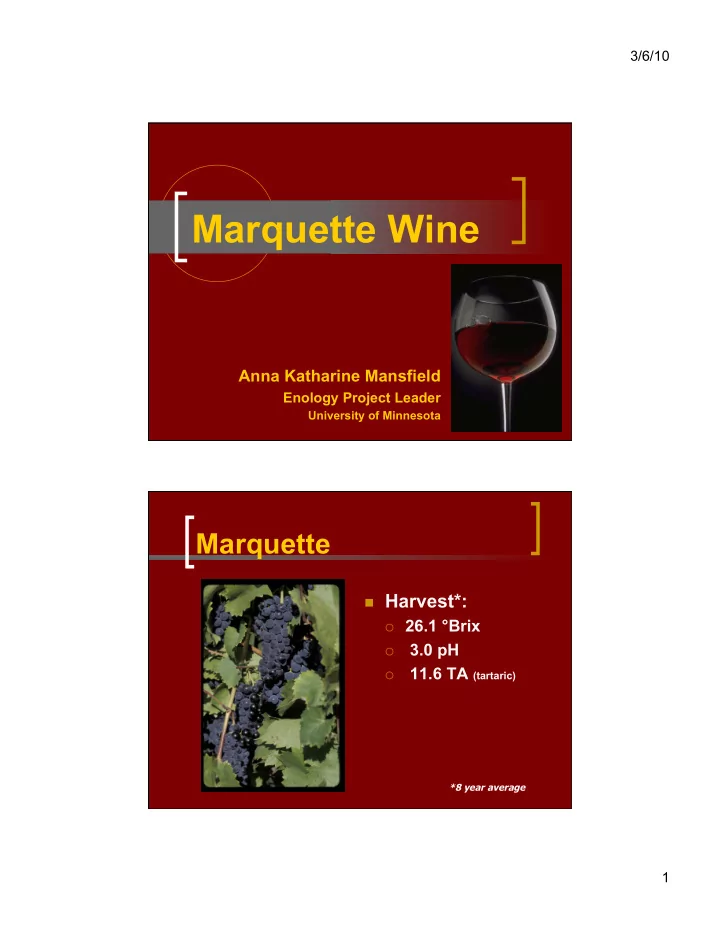

3/6/10 Marquette Wine Anna Katharine Mansfield Enology Project Leader University of Minnesota Marquette Harvest*: 26.1 °Brix 3.0 pH 11.6 TA (tartaric) *8 year average 1
3/6/10 Final Chemistry Cultivar % Alcohol pH TA (g/L) Marquette 14.6 3.3 8.2 Maréchal 12.8 3.4 7.9 Foch Frontenac 13.4 3.3 10.3 Merlot 12.4 3.4 7.2 All cultivar data averaged over 4 years, 2003-2006 Juice Phenolics (AU) Visible Cultivar Total Density Hue Color 12.0 5.6 6.5 1.0 Marquette Maréchal 9.6 2.1 3.6 0.8 Foch 22.6 15.6 21.2 0.3 Frontenac 1.5 0.8 1.5 0.8 Merlot All cultivar data averaged over 4 years, 2004-2007 2
3/6/10 Sensory Ruby similar to V. vinifera Complex, well-balanced palate cherry black currant black pepper berry spice Moderate tannins Comparable to Pinot noir Maceration Nutrients Good N 2 concentrations; ammonia may be low Further research needed Fermentation: 7-10 days on skin Optimal tannin extraction Color rich but not inky; Vinifera -like Extended maceration? Fermentation temperature Moderate temps (70°F) High temperature may suppress fruity notes 3
3/6/10 Fermentation Yeast Pasteur Red (Red Star) BM 45 (Lallemand)* Jammy fruit, cedar, earthy notes; enhanced body RC212 (Lallemand)* Berry fruit, spice Strains tolerant of moderate to high alcohols * Nutrient addition recommended with these yeasts Malolactic Malolactic fermentation High malic acid content? As much as 3 g/L drop in TA Strains tolerant of higher alcohol, low pH CH 11 ( Chris Hansen ) 4
3/6/10 Malolactic Inoculation time Sequential Last third of AF, or a few days following Racking? Co-inoculation Addition 1 day following fermentation Quicker MLF, lower diacetyl ICVD 254 + VP41, Vitalactic H+, Enoferm beta ( Lallemand) Alcohol Alcohol content? Can be as high as 14-15% Amelioration Blending Maréchal Foch, St. Croix 5
3/6/10 Finishing Cold Stabilization Highly recommended Chemical Deacidification Usually, only minor additions needed Final TA: 6.5-7.5 g/L Aging Oak Aging Highly recommended Barrels, beans, chips or spirals Heavy toast preferred over medium in winemaker’s roundtables Enological tannins Generally not recommended 6
3/6/10 Issues High alcohol Amelioration Seasonal variation Tannins lower some seasons Overcropping? Moderate acid Potential pH/acid discrepancy Works in progress Continued co-inoculation research NOPA analysis Port production Rosé production 7
3/6/10 8
Recommend
More recommend